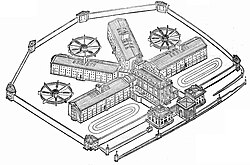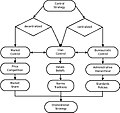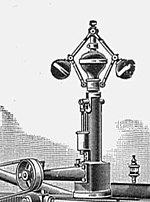Control theory is a field of control engineering and applied mathematics that deals with the control of dynamical systems in engineered processes and machines...
45 KB (6,774 words) - 01:00, 17 March 2025
The gate control theory of pain asserts that non-painful input closes the nerve "gates" to painful input, which prevents pain sensation from traveling...
17 KB (1,895 words) - 05:28, 25 May 2025
Optimal control theory is a branch of control theory that deals with finding a control for a dynamical system over a period of time such that an objective...
32 KB (4,734 words) - 15:42, 26 May 2025
criminology, social control theory proposes that exploiting the process of socialization and social learning builds self-control and reduces the inclination...
20 KB (2,500 words) - 13:55, 25 May 2025
Perceptual control theory (PCT) is a model of behavior based on the properties of negative feedback control loops. A control loop maintains a sensed variable...
64 KB (8,050 words) - 17:50, 23 April 2025
self-control theory of crime, often referred to as the general theory of crime, is a criminological theory about the lack of individual self-control as...
8 KB (1,022 words) - 15:29, 25 May 2025
In control theory, affect control theory proposes that individuals maintain affective meanings through their actions and interpretations of events. The...
18 KB (2,137 words) - 14:19, 30 July 2022
from—the Hamiltonian of classical mechanics, the Hamiltonian of optimal control theory was developed by Lev Pontryagin as part of his maximum principle. Pontryagin...
22 KB (3,975 words) - 08:46, 9 August 2024
Control theory in sociology is the idea that two control systems—inner controls and outer controls—work against our tendencies to deviate. Control theory...
4 KB (485 words) - 09:05, 11 May 2025
Classical control theory is a branch of control theory that deals with the behavior of dynamical systems with inputs, and how their behavior is modified...
11 KB (1,801 words) - 03:18, 31 July 2024
Identity control theory is a theory in sociology concerned with the development of personal identity. Created by Peter Burke, it focuses on the nature...
22 KB (3,409 words) - 05:22, 1 January 2025
A plant in control theory is the combination of process and actuator. A plant is often referred to with a transfer function (commonly in the s-domain)...
2 KB (189 words) - 15:50, 6 December 2022
mechanisms. Simple on–off control systems like these can be cheap and effective. Linear control are control systems and control theory based on negative feedback...
9 KB (1,835 words) - 14:33, 23 April 2025
optimal control theory, a control is a variable chosen by the controller or agent to manipulate state variables, similar to an actual control valve. Unlike...
1 KB (172 words) - 00:57, 19 March 2023
Dual control theory is a branch of control theory that deals with the control of systems whose characteristics are initially unknown. It is called dual...
3 KB (389 words) - 17:49, 10 January 2024
mechanism. These systems could relate to control theory, physiology, or computing. With feed-forward or feedforward control, the disturbances are measured and...
31 KB (4,325 words) - 06:57, 25 May 2025
notion of orbit of a control system used in mathematical control theory is a particular case of the notion of orbit in group theory. Let q ˙ = f ( q ...
5 KB (784 words) - 11:25, 23 March 2025
of self-control can strengthen and improve the ability to control oneself over time. Self-control is also a key concept in the general theory of crime...
68 KB (8,601 words) - 03:43, 17 June 2025
Collaborative Control Theory (CCT) is a collection of principles and models for supporting the effective design of collaborative e-Work systems. Beyond...
18 KB (2,201 words) - 23:46, 6 June 2025
The theory of planned behavior (TPB) is a psychological theory that links beliefs to behavior. The theory maintains that three core components, namely...
43 KB (5,430 words) - 16:29, 23 May 2025
control systems, applying control theory to design equipment and systems with desired behaviors in control environments. The discipline of controls overlaps...
22 KB (3,042 words) - 13:10, 23 March 2025
Control mastery theory or CMT is an integrative theory of how psychotherapy works, that draws on psychodynamic, relational and cognitive principles. Originally...
36 KB (4,632 words) - 18:44, 7 March 2024
are used in control theory to synthesize controllers to achieve stabilization with guaranteed performance. To use H∞ methods, a control designer expresses...
9 KB (1,097 words) - 20:49, 2 July 2024
The supervisory control theory (SCT), also known as the Ramadge–Wonham framework (RW framework), is a method for automatically synthesizing supervisors...
2 KB (229 words) - 14:37, 23 May 2024
Nonlinear control theory is the area of control theory which deals with systems that are nonlinear, time-variant, or both. Control theory is an interdisciplinary...
12 KB (1,328 words) - 20:01, 14 January 2024
Stochastic control or stochastic optimal control is a sub field of control theory that deals with the existence of uncertainty either in observations or...
12 KB (1,686 words) - 10:43, 4 May 2025
Proportional–integral–derivative controller (redirect from PID control)
constitutes a disturbance to the robot arm control process. In theory, a controller can be used to control any process that has a measurable output (PV)...
85 KB (12,066 words) - 07:08, 16 June 2025
the original system. Control theory Lead–lag compensator Ogata, Katsuhiko (2010). "Introduction to Control Systems". Modern Control Engineering 5th Edition...
1,021 bytes (130 words) - 21:35, 24 August 2023
intelligence theory — Progressive education theory Engineering: Circuit theory — Control theory — Signal theory — Systems theory — Information theory Film: Film...
38 KB (4,341 words) - 16:56, 25 May 2025
on trade Internal control, a process to help achieve specific goals typically related to managing risk Control (optimal control theory), a variable for...
9 KB (1,017 words) - 15:08, 28 May 2025









